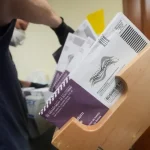

(The Center Square) – Jurors are off until next year at the bribery and racketeering trial of former Illinois House Speaker Michael Madigan and codefendant Michael McClain.
The court is in recess until Dec. 30, when Judge John Robert Blakey scheduled a charge conference for attorneys and parties. Blakey instructed the jury to return on Jan. 2, 2025.
Madigan’s defense team began calling witnesses and presenting evidence Thursday at the Everett McKinley Dirksen U.S. Courthouse in Chicago. Madigan attorney Dan Collins called real estate developer Andrew Cretal to the witness stand Thursday morning. In 2017, Cretal oversaw the Union West development project in Chicago’s West Loop.
Cretal testified about a meeting with then-Chicago Alderman Daniel Solis on June 29, 2017, and discussions about potentially hiring Madigan’s private law firm, Madigan and Getzendanner, for the development’s real-estate tax work.
Cretal testified that he did not call Solis to let him know that his firm had hired Madigan and Getzendanner for the Union West project.
When asked by Collins, Cretal said he never felt fearful, intimidated or threatened by Getzendanner or Madigan. Cretal said he came to have a positive impression of the Madigan and Getzendanner law firm in 2017.
Cretal recalled Solis asking him about hiring Madigan’s law firm at a meeting Solis recorded on June 29, 2017.
“You know, I don’t know anything about his firm. I know he’s the Speaker,” Cretal told Solis during the meeting.
“We both know, the kind of reputation he has,” Solis said, laughing.
“That’s all I know is he’s the Speaker, and he’s a Democrat,” Cretal said.
In cross-examination, Cretal told government attorney Sarah Streicker he was aware that an alderman could decide whether or not a project moved forward in his ward. Cretal said it was important to have Solis’ support, and that it was highly unlikely the project would have ever happened without Solis’ support.
Regarding Solis’ request to consider Madigan’s law firm, Cretal said he had never before had a request from a public official who could provide services as a vendor for a development project.
Cretal said he was nervous and apprehensive before meeting with Madigan. Cretal said there was a concern that the Union West project might not move forward if his firm did not hire Madigan’s firm.
Following Cretal, Madigan defense attorney Lari Dierks called former Madigan aide April Burgos to testify.
Burgos said she grew up in Chicago’s 13th Ward, which is home to Madigan’s political organization. Burgos worked in the 13th Ward office and said Madigan was one of the nicest, most genuine people she had ever met in her life.
Burgos said she would send and receive emails on Madigan’s behalf. She said she would help people with constituent services, even if they spoke badly of the speaker.
In cross-examination, government attorney Amar Bhachu displayed emails from precinct captain Ray Nice with constituent requests for signs and rodent control. Burgos said these were typical requests from precinct captains.
Madigan attorney Todd Pugh then called the speaker’s former chief counsel David Ellis, who is now an appellate judge for the First District Court in Illinois. Ellis also testified during the ComEd Four trial last year, which ended with McClain and three others being convicted of conspiracy, bribery and falsifying records.
Ellis said he was assistant counsel to the speaker from around 1999-2000, returned as chief counsel from 2006-2007 and again as special counsel in Chicago from 2012-2014.
Ellis said he came to work for Madigan through his former college and law school roommate Rob Uhe, who was the speaker’s chief counsel when Ellis became assistant counsel.
When working for a law firm in Chicago, Ellis said he became involved in litigation with the Democratic Party of Illinois in the wake of the 2000 presidential election.
When Pugh asked about bill review meetings, Ellis said the speaker asked a lot of questions, didn’t want “yes men” and wanted to get things right.
Ellis testified that Madigan basically ran his campaign when he first ran for judicial office and that McClain donated to his campaign fund. Ellis said the speaker did not play a role in Ellis’ successful 2024 reelection campaign.
Streicker began cross-examination with Ellis late Thursday afternoon and asked if the speaker’s office had more leverage in negotiations than ComEd did, and Ellis said, “True.”
Blakey instructed jurors not to discuss the case during the long break for Christmas. Once the jury was dismissed, Blakey reminded Ellis not to discuss his cross-examination and told his fellow judge, “Good to see you again.”
Pugh said the parties agreed that Ellis would return on Jan. 6 and that Madigan’s team would still fill the day on Jan. 2.
Before the court adjourned, McClain confirmed to Blakey that he declined to testify and that he had discussed the advantages and disadvantages of testifying with his attorneys.
Madigan is not expected to testify, but the former speaker has not formally waived his right to do so.
Former AT&T executive Steve Selcke completed his testimony Thursday morning.
Selcke told government attorney Julia Schwartz the decision to hire former state Rep. Eddie Acevedo, D-Chicago, was to avoid any negative implications with legislation which would benefit AT&T. Selcke said he believed the speaker had the ability to stall the legislation.
Schwartz introduced emails related to AT&T renewing contracts for 2016 with Acevedo’s firm, Apex Strategy LLC, and lobbyist Annazette Collins’ firm, Kourtnie Nicole Corp.
Collins, D-Chicago, was an Illinois state representative from 2001 to 2011 and an Illinois state senator from 2011 to 2013. She was sentenced in June of this year to one year in prison for underreporting and failing to file federal income taxes.
When asked if AT&T would have hired Acevedo had it not been for McClain’s outreach, Selcke said, “I don’t believe that we would have.”
When Selcke was finished, McClain’s defense team rested its case.
Connie Mixon, professor of Political Science and Director of the Urban Studies Program at Elmhurst University, said a lack of direct evidence makes it more difficult for prosecutors to prove there were bribes.
“It’s harder to make the case that there was actually a racketeering enterprise,” Mixon told The Center Square.
Mixon cited more blatant examples in other political corruption cases.
“It’s not, you said, the freezer full of cash or cash underneath a mattress that was handed specifically to Madigan or his associates,” Mixon said.
The jury was seated at 10:21 a.m. Thursday, after Judge Blakey discussed several areas of contention between prosecutors and the defense teams.
Schwartz said the government agreed not to introduce one exhibit but would instead ask questions related to it. Schwartz said the government would partially redact another exhibit, but Madigan attorney Todd Pugh objected, saying it amounted to hearsay. McClain attorney Patrick Cotter said the exhibit was cumulative in addition to being hearsay.
The judge overruled the hearsay objection and allowed the redacted email to be introduced.
In another area of dispute, Blakey said he would allow particular testimony from Union West developer Andrew Cretal, over an objection from Streicker. Madigan attorney Dan Collins had said that he wanted to ask Cretal, “Did you feel you were extorted?”
Collins continued to make an argument until Blakey intervened.
“I ruled in your favor, right?” Blakey asked.
“Yes, you did,” Collins answered.
Blakey read a note from a juror which said, for the last year, the juror had a trip booked to visit New Orleans for the Super Bowl in February of 2025.
In the note, the juror inquired about the judge’s thoughts on an updated ending for the trial.
Blakey said, “I know the Bears aren’t there.”
The judge then asked attorneys for their thoughts and suggested that the trip should not be an issue, although he normally does not give an end date for trials.
Prosecutors and defense attorneys agreed, and Blakey told the jury that the trial would not affect the planned trip.
Madigan and McClain have pleaded not guilty to 23 counts of bribery, racketeering and official misconduct in connection with a scheme prosecutors have referred to as The Madigan Enterprise.
Madigan served in the Illinois House from 1971 to 2021 and was speaker for all but two years between 1983 and 2021. He chaired the Democratic Party of Illinois for 23 years.
McClain was a longtime lobbyist who previously served as a state representative in Illinois’ 48th district from 1973 to 1982.







